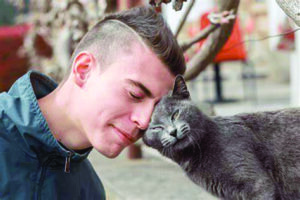By Dr. Beth Leermakers
“Dogs come when they’re called; cats take a message and get back to you later.”
— Mary Bly

Photo courtesy of Pets Bubble
Many cats are independent, aloof creatures, so it can be difficult to interpret their behavior and know what they’re thinking and feeling. Test your knowledge about feline behavior.
1. What is a sign that your cat loves you?
a. Slow blinking
b. Bringing you presents
c. Headbutting you
d. All of the above
e. None of the above. Cats don’t love their people.
2. Why might your cat be ignoring you?
a. He needs some alone time.
b. He doesn’t realize you want his attention.
c. He’s not feeling well.
d. He’s scared.
e. All of the above.
3. If your cat rolls over and shows you her belly, it means:
a. Pet me
b. I’m not interested
c. I’m tired
d. I trust you
4. Cats only purr when they’re relaxed or content.
a. True
b. False
5. Which is NOT a sign that your cat may be jealous of your new cat or dog:
a. Hissing, growling and swatting
b. Urinating outside the litter box
c. Biting or scratching
d. Chewing/shredding the furniture
e. Not eating
6. Your cat is quiet. Suddenly he sprints across the room. What does he want?
a. Exercise
b. Treats
c. A new scratching post
d. A nap
7. Your cat’s ears start to twitch. What emotion are they feeling?
a. Shyness
b. Sadness
c. Anxiety
d. Disgust
8. How should you greet your friend’s new cat?
a. Sit down so you are on the cat’s level.
b. Offer your hand for the cat to sniff.
c. Pick up the cat right away.
d. Stare at the cat until he pays attention to you.
e. A and B
f. C and D
Answers:
1. D. Cats use eye contact with their people to show affection. They will make eye contact with lowered eyelids and steady, slow blinks (considered the feline equivalent of a kiss).
Bumping their head — or rubbing their cheeks — against you is an attempt to mark you with their scent to claim you as one of their own. Scent glands in their cheeks secrete pheromones with a unique scent, so other cats know whose “territory” you are. Cats bring you presents (mice, birds or toys) as a sign of love and pride, to reward you for your love.
2. E. Cats are independent creatures who sometimes need their space. Older cats who don’t see and hear well may not realize you’re trying to interact. Move a little more slowly and deliberately to help your kitty become aware of you and decide if she feels like paying attention to you. Cats become more reclusive when they’re not feeling well, especially if they’re developing an illness. If you’ve noticed any symptoms (e.g., loss of appetite, drinking more), visit your vet. Cats ignore something they perceive as threatening. If you’ve yelled or swatted at your cat — or just accidentally stepped on her tail — she may give you the cold shoulder.
3. D. Cats express their trust by exposing their stomach, making themselves vulnerable. Some cats enjoy having their bellies rubbed, but others don’t — even when they show you their tummy. If your cat doesn’t swat you away when you gingerly touch her stomach, she’s open to being petted there.
4. B. False. Cats also purr when they’re upset, scared or injured. Cats may purr to soothe themselves when they’re stressed. A cat’s purr vibrates at a frequency of 25 to 150 hertz, which promotes the healing of bones, according to scientists.
5. E. Cats can become jealous when their environment changes — such as when you bring home a new cat, dog or person — and they feel they’re being excluded. Jealous cats tend to act out and express their displeasure through aggressive and destructive behavior.
Sometimes cats urinate on the new dog’s bed. Spend extra time with your cat to reassure her.
6. A. Cats need daily physical activity to prevent boredom and destructive behavior. Use a puzzle feeder, play with your cat and — if you’re up for a challenge — train him to walk on a leash.
7. C. Cats twitch their ears when they’re feeling agitated. Identify what may be making your kitty anxious (e.g., a change in environment or routine) and take steps to lessen the trigger(s).
8. E. Cats are territorial creatures that are wary of strangers. You have to earn a cat’s trust. Respect the cat’s boundaries, be patient and take your time when greeting a new cat. Avoid staring and full-body petting.
